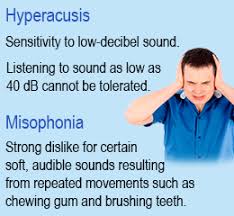 If you’ve never heard of misophonia or what a sound and noise disorder is, you may be unfamiliar with a rare population of individuals who suffer daily from severe symptoms of panic, anxiety, and generalized distress. Approximately less than 200,000 people in the United States alone suffers from misophonia, accounting for a total of 0.07 percent of the population. This extremely rare disorder can cause great distress for this population of people. Because of its rarity, sufferers may not even be familiar that what syndrome they are dealing with is truly acknowledged by the medical society as a disorder.
If you’ve never heard of misophonia or what a sound and noise disorder is, you may be unfamiliar with a rare population of individuals who suffer daily from severe symptoms of panic, anxiety, and generalized distress. Approximately less than 200,000 people in the United States alone suffers from misophonia, accounting for a total of 0.07 percent of the population. This extremely rare disorder can cause great distress for this population of people. Because of its rarity, sufferers may not even be familiar that what syndrome they are dealing with is truly acknowledged by the medical society as a disorder.
If you are unfamiliar with misophonia, you may suffer and not even know. We can help you understand the most common symptoms and signs associated with misophonia to better grasp if you may suffer from this rare illness.
What Exactly Is Misophonia?
Misophonia is a rare disorder that effects the way you process sounds around you and in your environment. Any sound can trigger symptoms and they all depend on how the individual person was raised. Some sounds can be more triggering than others, and the levels of symptoms relate directly to how much the person is triggered.
Common noises like a dripping faucet or the chewing of food can lead to high amounts of stress and anxiety in people with misophonia. The sooner you are able to identify symptoms and signs associated with misophonia, you may be able to determine if you are one of the few people in the world who deal with the syndrome.
Signs of Misophonia
When you first visit a doctor in hopes of identifying yourself with the stressful disorder of misophonia, the first questions will relate to the signs you have experienced. Signs and triggers of misophonia are different for different people, so depending on how you were raised, you may experience different ones than someone else who is already diagnosed with misophonia. Because of this, it is difficult to develop a comprehensive list of signs related to it.
Thankfully, statistics show common signs that can be related across the spectrum of those diagnosed with misophonia. Some of these signs include irritability when exposed to certain noises, sensitivity to specific sounds like tapping, bouncing, quiet hums, and specific words, and even constant fear of the public due to the inability to control your surroundings. If you are experiencing these signs, keep reading for significant symptoms related to them.
Symptoms of Misophonia
 Symptoms of misophonia differ from the signs of them, as symptoms directly relate to your actions associated with them. There are plenty of documented symptoms related to this syndrome and can range depending on the severity of your diagnosis. Some of the most common or frequently seen symptoms of misophonia include but are not limited to fear, rage, anxiety, emotional outbursts, or even feeling depressed or suicidal. Regardless of your symptoms, there are ways to treat them and allow you to live a calmer and more sound-tolerant life.
Symptoms of misophonia differ from the signs of them, as symptoms directly relate to your actions associated with them. There are plenty of documented symptoms related to this syndrome and can range depending on the severity of your diagnosis. Some of the most common or frequently seen symptoms of misophonia include but are not limited to fear, rage, anxiety, emotional outbursts, or even feeling depressed or suicidal. Regardless of your symptoms, there are ways to treat them and allow you to live a calmer and more sound-tolerant life.
When to Visit a Specialist
If while reading the above passages you recognized both signs and symptoms of misophonia that are present in your life, you may greatly benefit from visiting a sound disorder specialist like us here at Misophonia Cognitive Center.
Steven Katz LCSW is a top NYC misophonia specialist who can help identify your disorder and how to help you and your symptoms. Contact us today to schedule an appointment and allow you to have a happier, more comfortable life!
